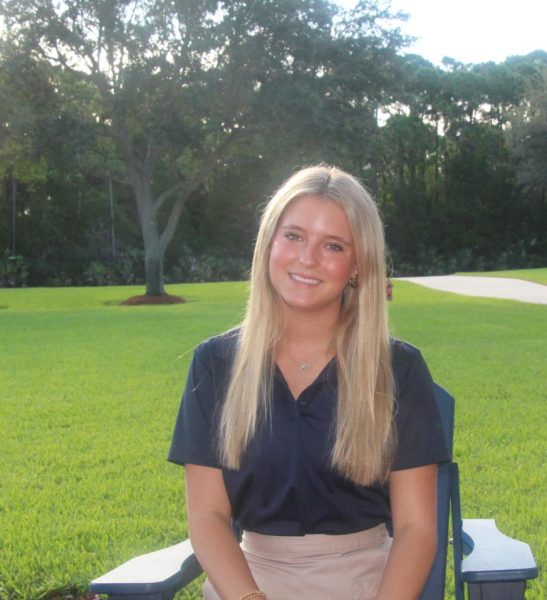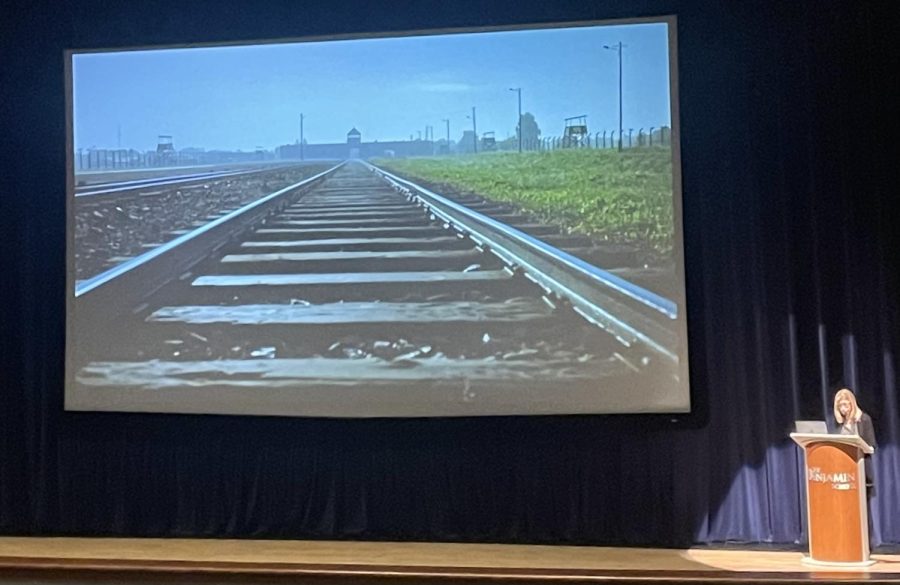Film, Lecture Reveal Jewish Resistance to Holocaust
Documentarian Paula Aspell shared segments of her film Resistance: They Fought Back, with the audience throughout her address. The Holocaust Remembrance Assembly aimed to challenge widespread misconceptions, including the idea that Jewish people went to concentration camps “like lambs to the slaughterhouse”
On Jan. 25, The Holocaust Remembrance Assembly, one of the most meaningful and important assemblies of the year, took place in Benjamin Hall. This assembly shined light on not just remembering all of the innocent people who were killed in the Holocaust, but also recognizing how the Jews fought back against their Nazi oppressors. This assembly involved faculty speakers, clips of a documentary, and a guest speaker.
For both students and faculty, the part of the assembly that stood out was the documentary that was shown. This documentary, Resistance: They Fought Back, focused on sharing the stories of people like Vladka Meed and Mordechai Anielewicz, or anyone else who resisted the Nazi forces violently or non-violently. Seeing and hearing stories of illegal schools, Warsaw Ghetto uprisings, and couriers getting weapons to the Jews gave a new perspective to everyone in the audience at this year’s Holocaust Assembly.
“This assembly in particular was important because of the idea of resistance,” said Upper School Social Studies teacher Anne Franzen. “I’m constantly asked why didn’t the Jews fight back and there are finally films and conversations out there about people who did and the idea that the Jews were not passively killed. There were people who fought back and I think there are more conversations about that today.”
Not only was this documentary shown, the creator of this work was also present at the assembly. Paula Apsell, one of the creators and an expert on resistance in the Holocaust, was there to share insight and go into more depth on many stories of the Holocaust. The entire assembly was astounded by her knowledge and saw her presentation as a very special part of the assembly.
“One part of the presentation that really stayed with me was how the speaker explained how she got into creating the amazing film. She explained to us why it’s so important to study the holocaust and understand it, instead of just giving us facts about it,” said sophomore Jonathan Vidal.
No matter what the most impactful part of the assembly was to each member of the Benjamin community, all those present agreed that this Holocaust remembrance was completely necessary and eye-opening.
Freshman Kaia Huttenlocher shared, “I think that the personal stories and pictures were very impactful. I learned a lot about how the Jews and other people stood up for themselves. They really did resist.”
The faculty always has many goals for these Holocaust Assemblies every year. There is one goal for the teachers and administrators at Benjamin that stands apart from the rest and it is simply remembrance.
“Every time we have Holocaust information in our assemblies or at school, obviously our goal is always to never forget, which is the idea that the Holocaust is an unspeakable tragedy but we need to make sure that people are always studying it and learning about it, so that’s always my goal,” said Mrs. Franzen.
While this year’s Holocaust Remembrance Assembly was heavy and eye-watering, many students have hopes of what future assemblies could look like or focus on. For students, learning more about this horrific event is important, which stresses the need for new and less talked-about topics to be shared each assembly.
“At the next Holocaust education event, I would like to see more physical items and objects from the places where the Holocaust occurred, on display for the students,” said Vidal. “It would be a lot more enticing for the students to learn about the Holocaust when they are presented with a tangible object.”
The Benjamin community as a whole sees the importance of having an assembly about the Holocaust every year. January’s assembly not only reinforced the horror that the students already knew about in the Holocaust but also offered a refreshing and truthful idea; resistance. The focus on resistance through a documentary and guest speaker taught students something new about the Jews in the Holocaust. It taught them that Jews did not go to be killed like sheep going to the slaughter. Overall, this Holocaust Remembrance Assembly was an emotional and touching event.

Haley Roth is a Junior at The Benjamin School, and is a third-year writer for The Pharcyde. Haley has attended the Benjamin School since kindergarten....


